We look forward to showing you Velaris, but first we'd like to know a little bit about you.
AI-driven customer engagement: practical strategies for CSMs
Uncover practical ways AI can improve customer engagement for Customer Success Managers, from sentiment analysis to personalized outreach.
The Velaris Team
February 10, 2026
AI-driven customer engagement helps Customer Success teams deliver timely, personalized interactions at scale by analyzing customer behavior, sentiment, and lifecycle signals in real time.
For many CSMs, the challenge is not wanting to be proactive, but being buried under the sheer volume of tasks. Managing hundreds of accounts makes it hard to know who needs attention right now and where to focus limited time. Engagement is forced to work in reactive mode, triggered only by escalations or renewal deadlines.
In this guide, you’ll learn how AI transforms customer engagement, and the practical ways CSMs can use AI to personalize outreach at scale. We’ll also explore implementation strategies, common pitfalls to avoid, and how AI helps teams uncover risk and drive long-term retention without increasing workload.
Key Takeaways
- AI shifts engagement from reactive outreach to proactive relationship management.
- Predictive insights, sentiment detection, and behavioral triggers are now core engagement drivers.
- The highest-performing CS teams use AI to surface risk, prioritize outreach, and personalize communication automatically.
- AI-native platforms like Velaris turn customer signals into next-best actions instead of dashboards.
- Successful adoption requires clear goals, phased rollout, and continuous optimization.
What is AI-driven customer engagement?
AI-driven customer engagement uses artificial intelligence to analyze customer behavior, sentiment, and lifecycle data so teams can deliver timely, personalized interactions automatically. Instead of relying on static playbooks or manual outreach, AI continuously evaluates customer signals and highlights when action is needed, helping teams engage with greater precision and relevance.
At its core, AI shifts engagement from effort-driven to insight-driven. Rather than guessing which customers need support, teams can prioritize outreach based on real indicators such as declining usage, negative sentiment, stalled onboarding, or expansion readiness.
How it differs from traditional engagement
Manual to intelligent
Traditional engagement depends heavily on CSM intuition and manual tracking. AI augments decision-making by processing large volumes of customer data instantly, surfacing patterns humans might miss, and recommending where to focus.
Scheduled to signal-based
Instead of relying solely on preset cadences like quarterly check-ins, AI enables engagement triggered by real-time behavior. For example, a sudden drop in product usage can automatically prompt outreach before risk escalates.
Generic to contextual
AI makes personalization scalable. Messaging, recommendations, and support can be tailored to a customer’s role, maturity, adoption level, or recent interactions, creating engagement that feels relevant rather than automated.
Reactive too predictive
Perhaps the biggest shift is moving from responding to problems after they appear to anticipating them early. Predictive models help teams identify churn risk, friction points, or growth opportunities sooner, allowing for calmer, more strategic conversations instead of last-minute scrambling when the risks have already created consequences..
Why AI is becoming essential for customer engagement
AI is becoming essential because customers expect personalization, speed, and relevance, outcomes that manual workflows simply cannot deliver at scale. According to McKinsey, 71% of consumers expect companies nowadays to deliver personalized content.
Rising customer expectations
Modern customers are accustomed to highly personalized digital experiences. They expect vendors to understand their goals, anticipate their needs, and communicate with context. Delayed or generic feeling engagement signals a lack of attentiveness.
AI helps teams meet these expectations by analyzing behavior and tailoring interactions so customers feel recognized rather than managed.
Scale without headcount
Customer portfolios continue to grow, but team sizes rarely expand at the same pace. Without AI, CSMs are forced to prioritize reactively, often focusing only on the loudest accounts.
AI enables teams to support more customers without sacrificing quality by automating routine outreach, identifying who needs attention, and guiding where human effort will have the greatest impact.
Data overload across tools
Customer signals are scattered across emails, support tickets, call recordings, product analytics, and CRM notes. Manually connecting these dots is time-consuming and often unrealistic. AI consolidates and interprets this data, transforming fragmented inputs into clear insights so teams can act faster and with more confidence.
Need for proactive retention
Retention is increasingly determined by how early teams detect risk. Waiting for renewal conversations to uncover dissatisfaction is no longer viable. AI helps surface early warning signs such as declining engagement or negative sentiment, allowing teams to intervene before small issues become churn events.
How AI enhances customer engagement
AI enhances customer engagement by helping teams anticipate customer needs, personalize communication, and act on real-time signals instead of relying on manual follow-ups.
Predictive insights for proactive outreach
AI analyzes behavioral patterns, engagement trends, and communication signals to identify customers who may be drifting before the risk becomes obvious. Instead of discovering dissatisfaction during a renewal conversation, teams can intervene early with targeted support, training, or strategic check-ins.
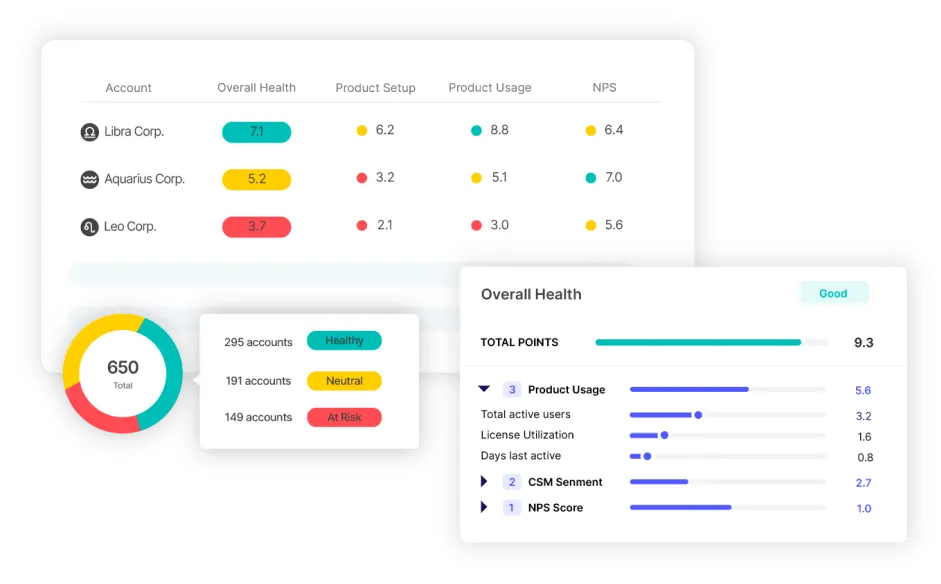
Velaris, a highly rated platform on G2, strengthens predictive engagement by combining customer health scores with sentiment analysis. By fusing behavioral data with emotional signals, teams gain a clearer understanding of both what customers are doing and how they feel, enabling earlier and more accurate intervention.
Personalization at scale
Delivering tailored engagement manually is nearly impossible once account volumes grow. AI enables behavior-triggered messaging like email campaigns based on lifecycle stage, product usage, milestones, or risk signals.
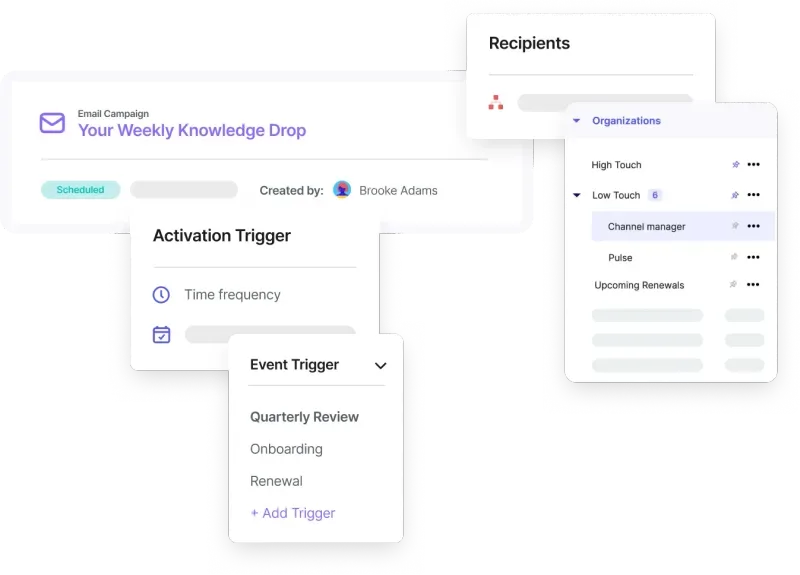
For example, customers who adopt a new feature can automatically receive advanced guidance, while those showing low engagement can be nudged with helpful resources. This ensures communication feels relevant rather than automated.
Conversation intelligence and sentiment detection
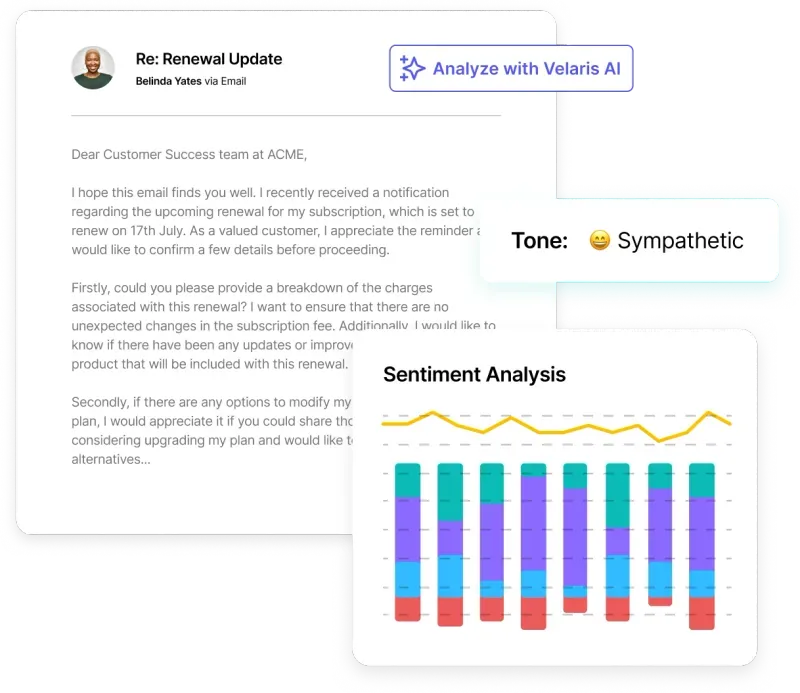
Customer intent is often hidden inside conversations. AI can analyze emails, calls, and support tickets to uncover tone, urgency, frustration, or expansion interest that might otherwise go unnoticed.
Velaris has two highly useful features to optimize conversational intelligence:
- CallSense extracts risks, sentiment, and key themes directly from customer conversations.
- Trending Topics automatically surfaces recurring issues across accounts, helping teams identify systemic blockers and respond faster.
Together, these capabilities transform everyday interactions into actionable engagement insights.
Continuous feedback intelligence
AI-powered surveys and feedback loops make it easier to collect meaningful input without overwhelming customers. Responses can be automatically categorized, prioritized, and routed to the right teams.
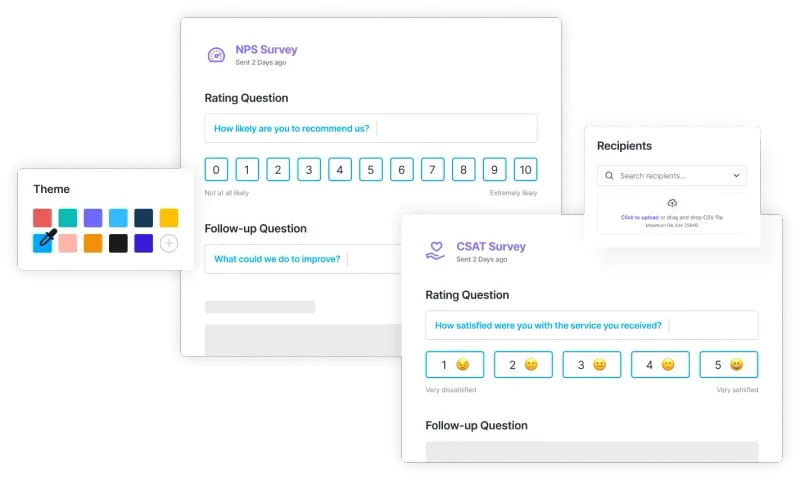
This allows Customer Success teams to close the loop faster, address concerns proactively, and continuously refine the customer experience based on real signals rather than assumptions.
AI-driven next-best-action systems
One of AI’s most powerful contributions is its ability to recommend what to do next. By evaluating multiple data points simultaneously, AI can:
- Recommend outreach at the right moment
- Suggest escalation when risk increases
- Highlight expansion opportunities
- Prioritize accounts that need immediate attention
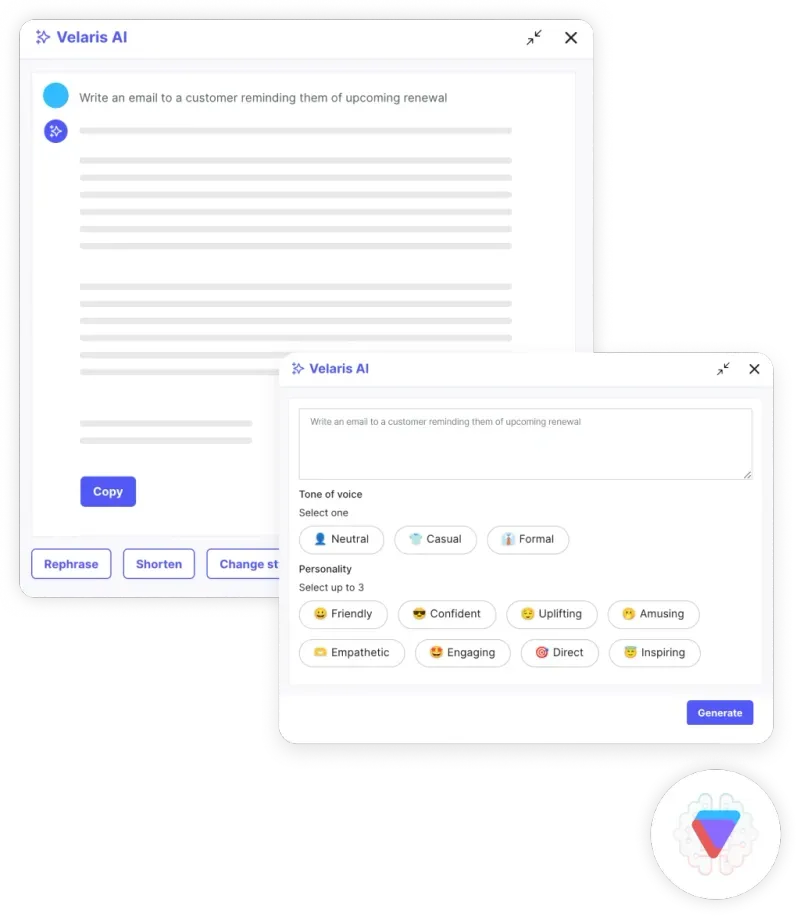
Velaris Copilot, for example, provides next-best-action recommendations grounded in customer data, conversations, and behavioral signals. Instead of guessing the right move, CSMs receive guided recommendations that help them act quickly and confidently.
High-impact AI engagement strategies for CS teams
The most effective AI engagement strategies combine predictive outreach, behavioral automation, sentiment monitoring, and lifecycle-based personalization so teams can act at the right moment without losing context.
Behavioral-triggered engagement
AI enables engagement to trigger based on what customers actually do, not static schedules. Usage dips, missed milestones, repeated errors, or long periods of inactivity can automatically prompt education, check-ins, or internal alerts. This ensures customers receive help when friction appears, not weeks later during a review or renewal.
Lifecycle-based automation
Customer needs change as they move from onboarding to adoption to renewal. AI helps tailor engagement to each stage of the lifecycle.
Early stages focus on activation and guidance, mid-lifecycle engagement reinforces value and adoption, and renewal-stage automation surfaces risks, outcomes, and expansion signals. This keeps engagement relevant throughout the relationship.
Risk-based prioritization
When CSMs manage hundreds of accounts, not all engagement should be treated equally. AI continuously evaluates health, sentiment, and behavior to surface which accounts need human attention now. This allows teams to focus time and effort where it will have the greatest impact instead of spreading attention thinly across all accounts.
AI-assisted communication
AI can support CSMs directly in day-to-day communication by drafting responses, suggesting tone, and recommending next steps based on past interactions and current context.
This improves consistency, reduces response time, and helps teams maintain a thoughtful, empathetic voice even at scale.
Unified signal monitoring
The strongest engagement strategies rely on a complete view of the customer. AI brings together product usage, conversations, surveys, and support data into a single stream of insight. By monitoring these signals together rather than in isolation, teams can understand not just what is happening, but why, and respond with clarity and confidence.
How to implement AI-driven engagement successfully
Successful AI adoption requires clear goals, a phased rollout, strong team enablement, and ongoing optimization. When implemented thoughtfully, AI enhances human decision-making instead of adding complexity.
Set measurable engagement goals
Start by defining what success looks like. Whether the objective is improving response times, increasing product adoption, reducing churn, or boosting expansion, measurable goals provide direction and make it easier to evaluate AI’s impact.
Tie these goals to specific metrics such as engagement rate, health score improvements, renewal rates, or customer sentiment.
Start with high-impact use cases
Avoid trying to implement AI everywhere at once. Focus first on areas where automation and intelligence can deliver immediate value, such as churn detection, behavioral outreach, sentiment monitoring, or renewal risk alerts. Early wins build confidence across the organization and create momentum for broader adoption.
Keep humans in the loop
AI should guide decisions, not replace relationships. Use AI to surface insights, recommend actions, and prioritize accounts, while leaving nuanced conversations and strategic decisions to CSMs. This balance preserves the human touch that customers expect while improving speed and consistency.
Train teams early
Adoption often determines whether AI initiatives succeed or stall. Provide practical training that shows teams how AI supports their workflows rather than complicates them.
When CSMs understand how to interpret AI insights and act on recommendations, they are more likely to trust the system and integrate it into their daily work.
Optimize continuously
AI-driven engagement is not a one-time setup. Regularly review performance, analyze outcomes, and refine workflows based on what is working. Monitor engagement metrics, gather internal feedback, and adjust triggers or messaging as customer needs evolve. Continuous optimization ensures AI remains aligned with both customer expectations and business goals.
How to choose an AI-driven engagement platform
The right AI-driven engagement platform should unify customer data, surface insights automatically, and connect intelligence directly to action. Instead of forcing teams to interpret dashboards manually, modern platforms help CSMs understand what is happening and what to do next.
Unified data architecture
AI is only as strong as the data behind it. Look for a platform that consolidates product usage, support activity, communication history, feedback, and lifecycle data into a single view. A unified architecture eliminates blind spots and ensures engagement decisions are based on complete customer context rather than fragmented signals.
Real-time AI analysis
Engagement opportunities are often time-sensitive. Platforms should analyze behavioral and conversational data continuously, flagging risks, sentiment shifts, and adoption gaps as they emerge. Real-time intelligence allows teams to intervene earlier, often before customers raise concerns.
AI native Customer Success platforms take this further by analyzing interactions across emails, calls, and tickets to surface trends and engagement risks automatically, helping teams stay proactive instead of reactive.
Workflow automation
Insights only matter if teams can act on them quickly. Choose a platform that connects AI signals directly to workflows, triggering outreach, tasks, or playbooks when specific conditions are met. This ensures engagement becomes systematic rather than dependent on manual follow-ups.
With Velaris, automation can activate lifecycle workflows based on health changes, behavioral signals, or sentiment shifts, allowing teams to scale personalized engagement without increasing workload.
Next-best-action capability
The most advanced platforms do more than highlight problems. They recommend what to do next. AI-driven next-best-action systems help CSMs prioritize accounts, craft responses, and decide when escalation is needed.
Look for an AI feature that recommends outreach strategies, suggests responses, and guides CSMs toward the actions most likely to improve customer outcomes.
Ease of adoption
Even the most powerful AI platform will fail if teams struggle to use it. Look for intuitive interfaces, clear workflows, and minimal administrative overhead. Faster adoption leads to faster value and reduces resistance across the organization.
Velaris is designed with usability in mind, enabling teams to operationalize AI quickly without requiring heavy configuration or dedicated admin support.
When evaluating platforms, prioritize those that turn intelligence into execution. The goal is not just to understand customers better, but to engage them at the right moment with the right action.
Common mistakes teams make with AI engagement
The biggest mistakes with AI engagement usually stem from treating AI as a shortcut rather than a strategic capability. While AI can dramatically improve personalization and efficiency, poor implementation can weaken customer relationships instead of strengthening them.
Here are the pitfalls Customer Success teams should actively avoid:
Over-automating relationships
Automation should support human connection, not replace it. When every touchpoint becomes automated, customers can quickly sense the lack of authenticity.
Watch for signs like:
- Messages that feel templated or mistimed
- Outreach triggered without real context
- Customers receiving communication during sensitive moments
What to do instead: Use AI to identify when engagement is needed, but let CSMs handle high-impact conversations such as escalations, renewals, and executive alignment.
Ignoring data hygiene
AI amplifies whatever data it receives. If your data is incomplete, outdated, or fragmented, AI will generate misleading insights.
Common risks include:
- Duplicate accounts
- Missing lifecycle stages
- Broken integrations
- Inaccurate usage data
Best practice: Establish clear data ownership, audit integrations regularly, and maintain a single source of truth before scaling AI workflows.
No workflow ownership
AI can surface risks and opportunities, but without defined ownership, nothing happens.
Many teams struggle because:
- Alerts go unassigned
- Playbooks lack accountable owners
- Escalations are unclear
Fix this early: Assign responsibility for every automated workflow. When a risk is flagged, someone should know exactly what action to take and how quickly.
Implementing AI without a strategy
Adopting AI simply because it is trending often leads to scattered workflows and low adoption internally.
Instead of asking “Where can we use AI?”, start with:
- Which engagement gaps are hurting retention?
- Where are CSMs spending too much manual effort?
- Which signals are currently being missed?
Build your AI rollout around measurable outcomes such as reduced churn risk, faster response times, or improved adoption.
Measuring the wrong metrics
Teams sometimes focus on activity metrics rather than impact. More automated emails or alerts do not automatically translate to better engagement.
Prioritize metrics that reflect real customer outcomes:
- Retention and expansion rates
- Customer health improvements
- Time-to-intervention for at-risk accounts
- Engagement quality, not just volume
Avoiding these mistakes helps ensure AI becomes a force multiplier for your Customer Success team rather than another layer of operational complexity. The goal is not just to automate engagement, but to make every interaction smarter, more timely, and more meaningful.
How to measure AI-driven engagement success
AI-driven engagement is successful when it improves customer relationships, accelerates response, and drives measurable retention and growth outcomes. Tracking the right metrics ensures your AI strategy delivers real business impact rather than just operational activity.
Engagement frequency
This measures how often customers interact with your team, content, or product after AI-driven outreach.
Look for:
- Increased replies to emails
- Higher participation in QBRs or training
- More product interactions following targeted nudges
Why it matters: Consistent engagement signals that communication is relevant and well-timed. If frequency rises without negative sentiment, your AI is likely improving customer touchpoints.
Response speed
AI should dramatically reduce the time between a customer signal and your team’s action.
Track metrics such as:
- First-response time
- Time-to-intervention after risk detection
- Follow-up speed after feedback
What good looks like: Faster responses without sacrificing quality. Quick action reassures customers and prevents small issues from escalating.
Sentiment improvement
AI-powered sentiment analysis allows teams to track emotional trends across emails, calls, surveys, and support interactions.
Monitor:
- Shift from negative to neutral/positive sentiment
- Reduced escalation tone
- Higher satisfaction indicators
Why it matters: Sentiment often changes before churn risk becomes visible in usage data. Improving sentiment is an early sign that engagement strategies are working.
Retention lift
One of the clearest indicators of AI success is whether customers stay longer.
Evaluate:
- Gross and net retention rates
- Churn reduction among flagged accounts
- Renewal velocity
Key insight: If at-risk accounts are being identified earlier and saved more often, AI is delivering strategic value.
Expansion revenue
Strong engagement does more than prevent churn. It uncovers growth opportunities.
Measure:
- Upsell and cross-sell revenue
- Expansion rate within highly engaged accounts
- Feature adoption tied to revenue growth
Expansion tends to follow naturally when customers clearly understand product value.
ROI of automation
AI should reduce manual workload while improving outcomes.
Calculate ROI by examining:
- Hours saved on repetitive tasks
- Accounts managed per CSM
- Cost-to-serve reductions
- Revenue influenced by proactive outreach
The goal is to have higher-impact Customer Success without proportional headcount growth.
Measuring these indicators together provides a holistic view of AI performance. Instead of focusing on isolated metrics, look for a pattern: faster action, healthier sentiment, stronger retention, and growing accounts.
When these move in the right direction, your AI-driven engagement strategy is doing exactly what it should.
The future of AI-driven customer engagement
Customer engagement is moving beyond simple workflow automation toward intelligence-driven orchestration. Instead of reacting to predefined rules, AI-powered systems are beginning to understand customer context, predict intent, and guide engagement dynamically across the entire lifecycle.
From automation to autonomous engagement
Traditional automation follows rules. The future is autonomous engagement.
Research by McKinsey suggests that companies that are mature in the AI and digital spaces will be able to deliver proactive, service-led engagement with more than 95% of their engagement being done via AI and digital channels.
AI systems are increasingly able to decide when, how, and why to engage customers based on real-time signals. Rather than triggering static workflows, AI orchestrates customer journeys by continuously evaluating behavior, sentiment, usage patterns, and outcomes.
This shifts Customer Success from managing processes to supervising intelligent systems that adapt as customers evolve.
Real-time sentiment systems
Engagement is becoming all about emotion.
Next-generation AI engagement platforms monitor sentiment across emails, calls, tickets, and surveys in real time. This allows teams to detect frustration, confusion, or disengagement the moment it appears, not weeks later in a renewal review.
Real-time sentiment systems enable immediate course correction and more empathetic, timely responses.
Journey orchestration engines
Customer journeys are becoming fluid, and less linear.
AI-powered orchestration engines guide customers across onboarding, adoption, renewal, and expansion by adjusting engagement based on progress and risk. Instead of pushing every customer through the same path, AI dynamically personalizes the journey, ensuring customers receive the right guidance, education, or intervention at the right moment.
Customer Success as a revenue engine
As engagement becomes more intelligent, Customer Success moves closer to revenue ownership.
AI-driven engagement connects customer behavior and sentiment directly to expansion signals. When customers are engaged, confident, and realizing value, opportunities for upsell and cross-sell surface naturally. This positions Customer Success not just as a retention function, but as a proactive growth engine that drives long-term revenue.
Conclusion
AI is quickly becoming the defining differentiator in customer engagement. As customer expectations rise, reactive Customer Success models are no longer enough to retain accounts or drive growth. Teams that rely on manual workflows or basic automation will always be a step behind.
Platforms like Velaris, which has a high rating on G2, are built for this new reality. As an AI-native Customer Success platform, Velaris helps teams surface risk sooner, personalize engagement at scale, and turn customer signals into timely, confident action across the lifecycle.
If you want to move from reactive engagement to proactive, intelligent Customer Success, book a demo to see how Velaris helps teams build stronger, more resilient customer relationships.
Frequently Asked Questions
What is AI-driven customer engagement?
AI-driven customer engagement uses artificial intelligence to analyze customer behavior, sentiment, product usage, and lifecycle signals so teams can deliver timely, relevant interactions automatically. Instead of relying on scheduled outreach, AI helps Customer Success teams engage customers based on real-time context and predicted needs.
How does AI improve customer retention?
AI improves retention by identifying churn risk earlier, surfacing disengagement signals, and recommending proactive outreach. By detecting patterns humans might miss, such as declining usage or negative sentiment, AI allows teams to intervene before issues escalate and strengthen relationships over time.
What data is needed for AI engagement?
Effective AI engagement typically relies on a combination of product usage data, communication history (emails, calls, tickets), customer feedback, health scores, and lifecycle milestones. The more unified and accurate the data, the more precise the insights and recommendations become.
What is the best AI platform for customer engagement?
The best platforms unify customer data, analyze signals in real time, and connect insights directly to workflows so teams can act immediately. AI-native platforms like Velaris are designed specifically for post-sale engagement, helping Customer Success teams detect risk, personalize outreach, and automate next-best actions at scale.
Can small CS teams benefit from AI for customer engagement?
Yes. AI is especially valuable for smaller teams because it extends their capacity without requiring additional headcount. Automation reduces manual workload, while predictive insights help teams focus their time on the accounts that need attention most.
The Velaris Team
A (our) team with years of experience in Customer Success have come together to redefine CS with Velaris. One platform, limitless Success.



